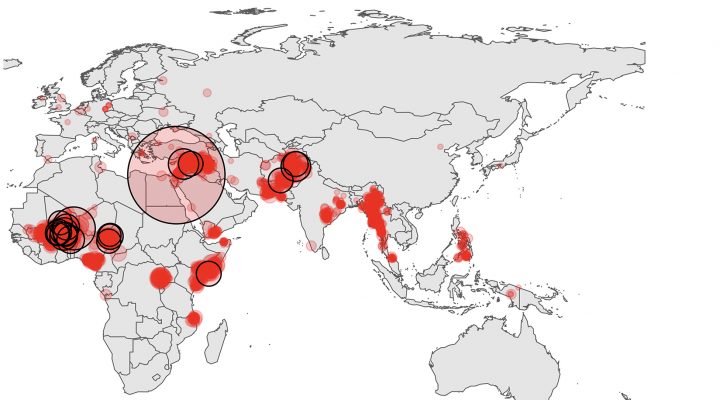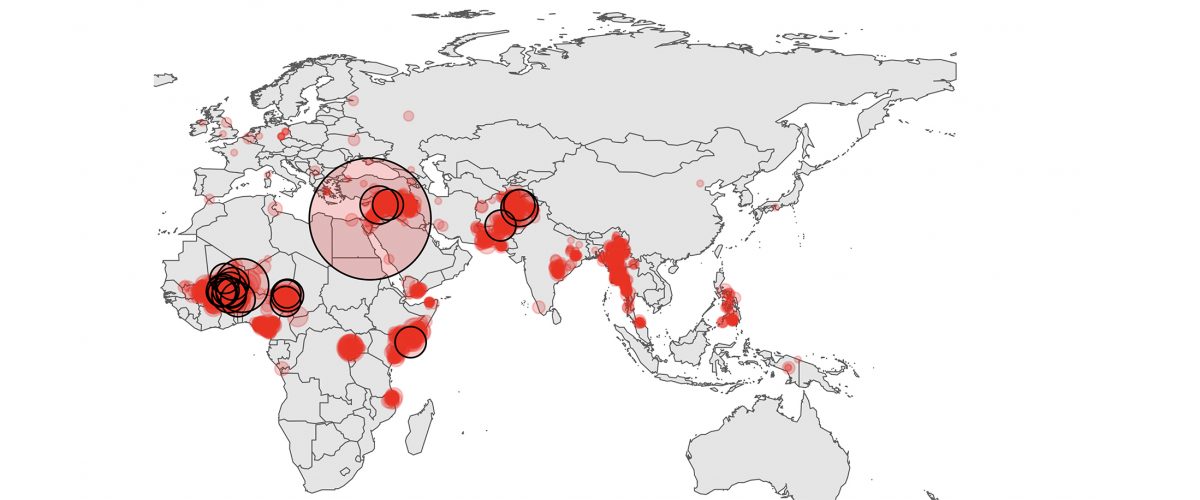In the study of insurgency and the disaster it leaves in its wake, few countries in recent years have suffered as much as Nigeria and Burkina Faso, two multiethnic and religiously diverse societies located in West Africa.
Both countries have become epicenters of mass killings and destructions of the worst kind perpetrated by terrorists.
On Aug. 24, in Barsalogho, Burkina Faso, an al-Qaeda-linked group, Jama’at Nusrat al-Islam wal-Muslimin, masterminded the killing of about 200 people while 140 people suffered various degrees of injuries.

(123rf.com)
In February, at least 12 civilians were killed while two others were injured during a terrorist attack at a Catholic church in Essakane village in the northern part of the country.
Four months later, an estimated 100 soldiers died from a terrorist-engineered attack on an army base in Mansila. Prior to that, an internally displaced persons camp in Goubré, North region, came under attack, leaving more than 70 people dead. Islamic terrorists allegedly carried out the attack as a warning to people unwilling to endorse the group’s vicious ways.
These are just a few of the terrorist attacks that Burkina Faso, a country currently under military rule, has come to be known for in recent times and which Human Rights Watch says violate international humanitarian law and constitute war crimes.
According to Human Rights Watch, quoting figures from the Armed Conflict Location and Event Data: “Islamist armed groups killed 1,004 civilians in 259 attacks between January and August, compared to the 1,185 civilians in 413 attacks in the same period last year. These figures do not include the 100 to 400 civilians killed during the Aug. 24 attack on the city of Barsalogho, Sanmatenga province, for which the JNIM claimed responsibility.”
In its assessment of the violence in Burkina Faso, the Global Terrorism Index 2024 revealed the country is now ranked first on its list of nations most impacted by terrorism.
“It is the first time a country other than Afghanistan or Iraq has been top of the index.”
“In the 13 years that the GTI covers, it is the first time a country other than Afghanistan or Iraq has been top of the index,” it says. “Almost 2,000 people were killed in terrorist attacks in Burkina Faso from 258 incidents, accounting for nearly a quarter of all terrorist deaths globally. The impact of terrorism in Burkina Faso has increased every year since 2014, with terrorism also surging in its neighbors, Mali and Niger. In Burkina Faso in 2023, deaths from terrorism were up 68%, even though attacks decreased by 17%.”
The numbers show 1,135 deaths in 2022 compared to 1,907 in 2023, a 68% high, despite a nearly 16% decline in the number of attacks last year. This is the second consecutive year that more than a thousand people were killed in terrorist attacks in the country. The rise in deaths, the report points out, coincided with an increased frequency of civilians being targeted, with civilians comprising more than half of victims.
Aside the casualty figures, the main targets or flashpoints also are highlighted.
“Northwestern Burkina Faso, near the country’s borders with Niger and Mali, experienced the most terror attacks, accounting for almost half of all attacks in 2023,” the report says. “Of the country’s 1,907 deaths in 2023, 1,000 occurred along the Niger border in Centre-Nord and Est. Burkina Faso’s deadliest attack of 2023 occurred in this area. In February, at least 71 soldiers were killed in the ambush. Security forces claimed to have killed 160 assailants in the fight, with IS claiming responsibility for the attack. This was the fifth deadliest attack in the world in 2023.”
“The most striking point is that the Fulani Ethnic Militia are killing Nigerian civilians unopposed.”
Another country on GTI list of countries most impacted by terrorism is Nigeria, along with Somalia, Niger and Mali. Africa’s most populous country, Nigeria, has been in the news for many years for its frequent religious crisis but a new report by the Observatory for Religious Freedom in Africa reveals the impact on defenseless citizens.
The report, titled “Countering the Myth of Religious Indifference in Nigerian Terror,” was published Aug. 29. It provides data behind the numbers, showing the impact of violent insurgency on Christians and Muslims and people of other faiths and the terror groups responsible.
While different terrorist groups are known to operate in Northern Nigeria, the report identifies the Fulani ethnic militia as a terrible weapon of war.
“The most striking point is that the Fulani Ethnic Militia are killing Nigerian civilians unopposed,” the report notes. “Mass killings, abductions and the torture of whole families go largely unchallenged as government forces pursue targets hundreds of miles away.”
Another issue cited in the report is the ethnic and religious background of the dead: “The data show that more Nigerian Christians were victims of violence than Nigerians holding to other religious affiliations. Among the 30,880 civilians killed in the four-year reporting period, the number of Christians killed was 16,769, while the number of Muslims killed was 6,235.”
Beyond the deaths and destruction highlighted in the reports, a major consequence of violent insurgency is the displacement and migration it sparks in societies. Burkina Faso and Nigeria, according to United Nations reports, are among the countries with a high number of millions of displaced people and refugees within and outside their countries.


